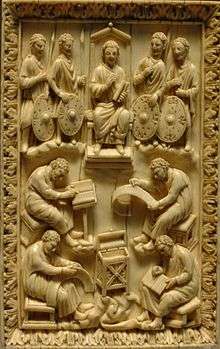Psalm 5

Psalm 5 is the 5th psalm from the Book of Psalms. Its authorship is traditionally assigned to king David. It is a reflection of how the righteous man prays for deliverance not only for freedom from suffering, but to allow himself to be able to serve God without distraction.[2]
Themes

Psalm 5 is within the genre of the morning prayer, because the morning was very important in the religions of the ancient Near East. Hence the verse 4 (3 in some versions). The Psalm opens with a lament, and continues with praise and requests that God punish evildoers. The psalmist describes the throat of the wicked as an open sepulcher. The Psalmist ends with a blessing extended to all those who trust in God.
Interpretation
The correct translation of the word Hebrew word הַנְּחִילֹ֗ות (in the superscription or verse 1) is unclear; the NRSV and the Luther Bible give it as "for flute" again.
The Septuagint, Vulgate and some Arabic translations attribute נחל from "inherit" meaning "per ea quae haereditatem consequitur"(vulgate) and κληρονομος (Septuagint). Accordingly, it would be translated into English as "in favor of those who receive the inheritance." Therefore, Augustine, Cassiodorus and others [3] had interpreted it as "those heirs of God".
A thoroughly Christological interpretation can be found in Martin Luther's work, who finds the third verse revealing that the humanization of man happens through the incarnation of Jesus Christ.[4]
Gerhard Ebeling sees in the Psalm both a complaining (verse 10) and also at the same time exultation and rejoicing (verse 12.)[5]
Uses
Judaism
In Judaism, verse 8 of psalm 5 is the second verse from Ma Tovu.[6]
Catholicism
According to the Rule of St. Benedict (530 AD), Psalm 1 to Psalm 20 were mainly reserved for office of Prime. Since the time of St. Benedict, the Rule of Benedict (530 AD) has used this psalm for the office Lauds on Monday (Chapter XIII)[7][8] In the Liturgy of the Hours, Psalm 5 is still recited or sung at Lauds on Monday of the first week.[9]
Music
Caspar cross Hamer (1546) created in 1537 the chorale An geystlich Bitlied drawn heavily from the Psalms.
References
- ↑ David dictating the Psalms, codex binding in the Treasure of Saint-Denis, (Louvre France), end of the 10th century–11th century.
- ↑ The Artscroll Tehillim page 6
- ↑ Augustinus: Enarrationes in Psalmos (vollständige englische Übersetzung), Cassiodor: Expositio in Psalterium.
- ↑ Luther, Weimarer Ausgabe (Luther) 5,128f.
- ↑ Gerhard Ebeling: Psalmenmeditation, (1968) p65.
- ↑ The Complete Artscroll Siddur page 12
- ↑ Traduction par Prosper Guéranger, (Abbaye Saint-Pierre de Solesmes, réimpression, 2007) p41.
- ↑ Psautier latin-français du bréviaire monastique,(1938/2003) p178.
- ↑ Le cycle principal des prières liturgiques se déroule sur quatre semaines.
External links
| Wikimedia Commons has media related to Psalm 5. |